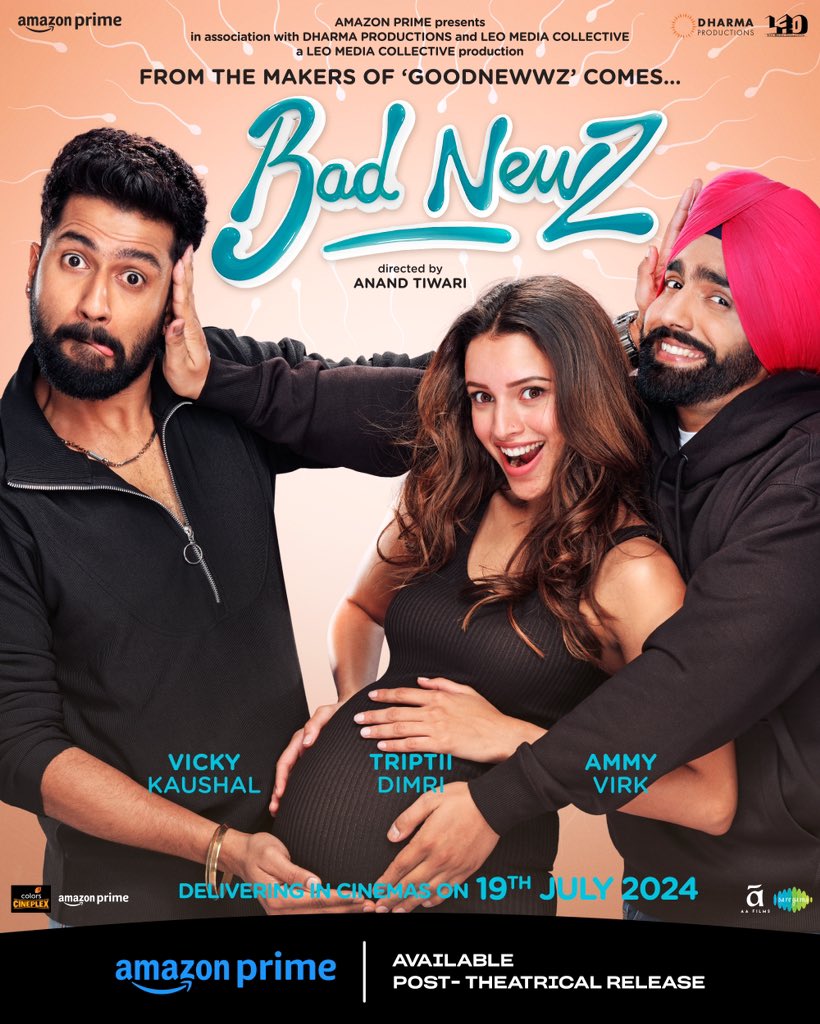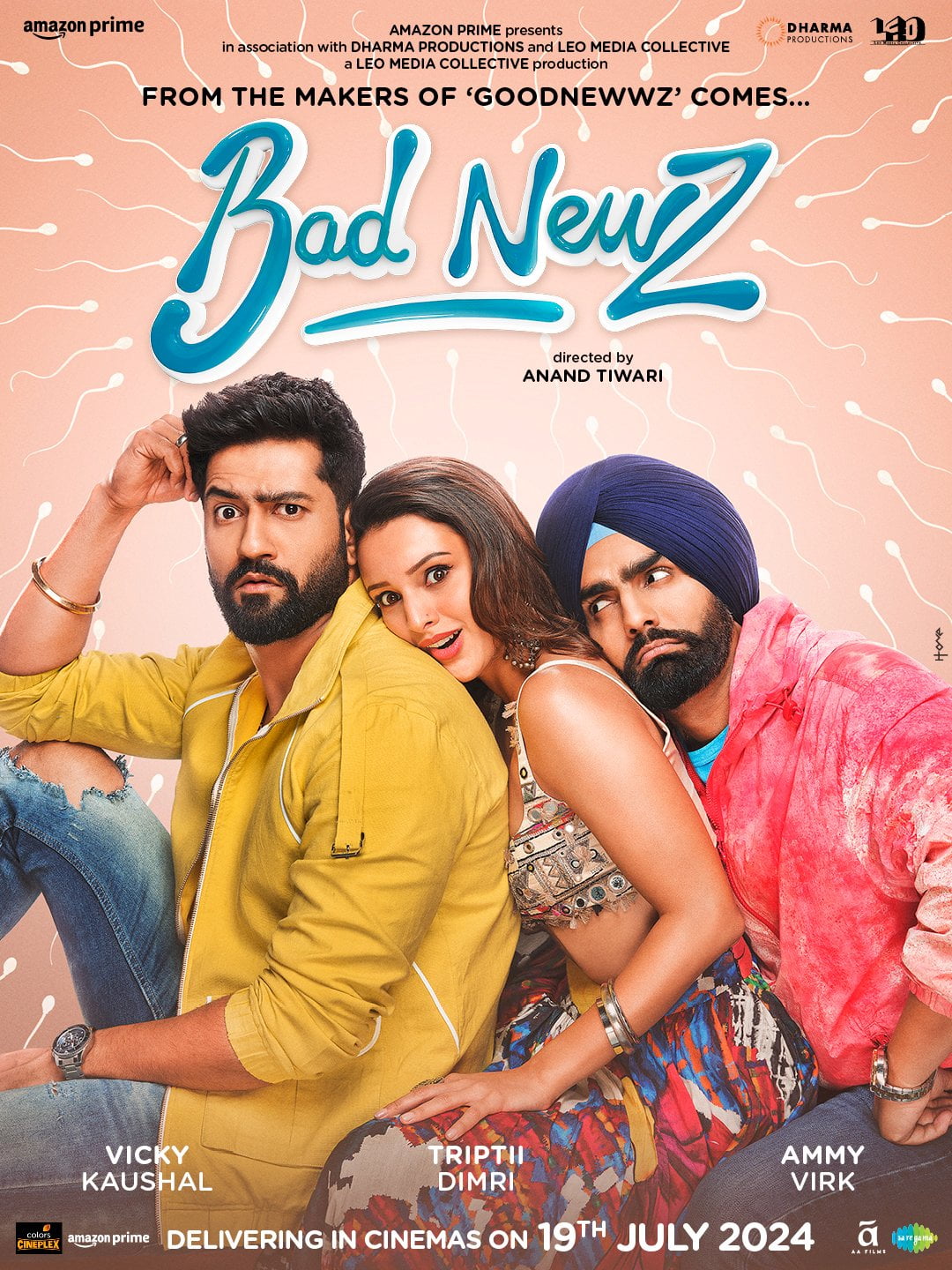The new Dharma Production sequel, Bad Newz, would make you want to walk out of the theatre during the intermission. Directed by Anand Tiwari, it lacks the depth and substance of its predecessor, Good Newwz. The film feels more like a generic Punjabi film tailored for a Hindi-speaking audience, with exaggerated background music and a focus on a rare medical condition called heteropaternal superfecundation. Anand Tiwari’s Bad Newz revolves around men who have opinions about childbirth despite not having the ability to give birth. Bad Newz centres its sense of women empowerment on the regressive mindsets of Indian conservatism.
Plot of Bad Newz
In the realm of Bollywood, love triangles have a profound biological impact on the characters involved, sparking intense chemistry and emotional turmoil. Filmmaker Anand Tiwari tries his best to craft this dynamic. However, Bad Newz only accounts for faltering the balance between progressive themes and traditional family values as it tries its best to appeal to orthodox mindsets.
However, Bad Newz only accounts for faltering the balance between progressive themes and traditional family values as it tries its best to appeal to orthodox mindsets.
The narrative of this tale unfolds in a flashback, culminating in a picturesque scene reminiscent of a commercial for Santoor soap. Ananya, the protagonist, confidently redirects the attention of the paparazzi towards her friend Saloni, acknowledging her as the true star of the moment. This unexpected gesture raises questions about the significance of Saloni, a chef, deserving of a biographical film dedicated to her life and achievements.
Saloni, a driven chef, had quickly fallen in love with Akhil Chaddha, a pampered West Delhi boy, and they had rushed into marriage. Despite their love, they divorced hastily due to clashes of ego and Akhil’s overbearing mother. Saloni moves to a new city, finds a job at a luxury hotel, and becomes involved with the mature and sensitive owner, Gurbir Pannu. Feeling jealous of Akhil moving on, she slept with Gurbir, only to discover that Akhil had not truly moved on. She also slept with him on the same night.
Saloni’s actions highlight the complexities of balancing career ambitions and relationships. The twins she is carrying symbolise the conflicting demands of her career and love life. Can they coexist, or must one sacrifice for the other? This dilemma is explained in Bad Newz through Saloni’s story in its nuance that regresses from its attempt to be a creation that supports feminist perspectives.
Flamboyance and orthodox mindsets: the portrayal of masculinity in Bad Newz
Bad Newz starts off promising but ultimately disappoints with its regressive themes and lack of sensitivity towards important issues. The film Bad Newz, with a runtime of 2 hours and 20 minutes, feels like a never-ending Instagram reel that drags on for way too long. The initial part of the film, where Akhil wins over Saloni and they fall in love despite her concerns about her career, is somewhat entertaining for the first thirty to sixty minutes. Vicky Kaushal’s portrayal of a Delhi guy is visually appealing and his on-screen chemistry with the lead actress is captivating. However, as Bad Newz progresses, everything starts to fall apart, including Akhil’s likability.
Vicky Kaushal’s portrayal of a Delhi guy is visually appealing and his on-screen chemistry with the lead actress is captivating.
Suddenly, Bad Newz transitions into a typical Indian soap opera with outdated dialogues, jokes about parents prioritising TV shows over their daughter’s happiness, and a woman’s career aspirations being ridiculed. The film’s second half trivialises the issue of consent, emphasising how the plot fails to embrace sensitivity and discern in the portrayal of particular scenes. It appears that the film is still trying to win over the audience’s conservative class by promoting outdated and inappropriate traditional beliefs held by the Indian society.
It is unrealistic to expect safe sex or comprehensive sex education between strangers in this context, let alone the possibility of the girl taking a contraceptive pill. In the second half, Saloni decided to leave her abode for her career, leaving Akhil behind. However, the topic is noticeably absent in the usual competitive banter exchanged between the two fathers. The least we could hope for was a well-crafted narrative. Why is Gurbir, who does not even have feelings for this woman, willing to engage in a competitive and degrading game with Akhil, who is open to accepting both children?
Instead of delving into their relationship with the mother of their future children, the film after the interval shifts focus to a trivial competition between the two men, disregarding the woman until she is needed again. It seems that her only purpose is to introduce a complication in the hero’s life to further develop his character.
A variety of quirky characters are brought into the story, including an eccentric aunt, a detective uncle reminiscent of a Bollywood character, and a lovestruck man who is determined to marry Saloni despite any obstacles. These characters are used for comedic effect, with the humour being drawn out to the point of being cringeworthy and nonsensical. It feels as though the story is trying to emulate the style of a popular comedy show, with the audience being forced to endure the excessive and self-indulgent jokes with no escape.
Tripit Dimri as Saloni: a lazy gag at women’s empowerment
Saloni is determined to achieve a ‘Meraki star‘, which is essentially a downgraded version of the prestigious Michelin star. However, as you observe her journey in Bad Newz, it becomes apparent that the creators lack the motivation to fully develop her character and give proper attention to her ambitious career goals. Instead, they prioritise focusing on making her look appealing for a honeymoon scene and insert numerous awkward jokes about actor Vicky Kaushal’s filmography and his wife.
What makes it even more frustrating is that she never wanted to become a mother in the first place, and the pressure from her family to have a child was a major source of discontent in her marriage.
Tripti Dimri’s character finds herself constantly diverted from her original desires. What makes it even more frustrating is that she never wanted to become a mother in the first place, and the pressure from her family to have a child was a major source of discontent in her marriage. Unfortunately, society rarely allows women to stand firm in their decision to remain childless or take preventive measures like using birth control.
It is ironic and somewhat comical in a tragic sense that India is now more advanced in terms of abortion rights and maternity policies compared to America. However, it is surprising that a contemporary Indian film centred around an accidental pregnancy fails to even touch upon the option of abortion. Bad Newz could have delved into the complexities of a modern family dynamic with three parents navigating their way through the situation, possibly considering abortion as a valid choice. Instead, the film opts for humour that borders on trolling. As the story progresses, the character Akhil becomes increasingly unbearable, prompting one to question why Saloni didn’t notice these glaring red flags earlier on.
It is not as though delving into a more serious tone for a brief moment would go against the typical genre conventions. In a poignant moment near the conclusion of the film, Akhil and his mother engage in a conversation about his willingness to raise a child that is not biologically his own. This particular scene had the potential to be a standout moment, with dialogue that resonates deeply, challenging outdated beliefs and showcasing the power of love conquering all obstacles yet it turns into second-hand embarrassment as Bad Newz tries to be a commercial film palpable to the average Indian masses that worships patriarchal and sexist films like Animal.
Tripit Dimri displays her acting prowess in some poignant sequences where one sees glimmers of her brilliance that surpass in films such as Qala and Bulbul, but the audience merely exalted her clichéd part in Animal, revealing the bigotry the audience has not yet recovered from.
There is little to discuss regarding the performances in Bad Newz because although the actors are competent, the lack of well-developed characters leaves little room for standout performances.
There is little to discuss regarding the performances in Bad Newz because although the actors are competent, the lack of well-developed characters leaves little room for standout performances. Instead, the focus seems to have been on crafting half-baked humour, incorporating nostalgic sound effects from classic films, and manipulating beloved Shah Rukh Khan moments to divert attention from the film’s weak storyline. Bad Newz explores an intriguing concept with its storyline involving a woman in India giving birth to twins with different fathers. This premise had the potential to be a captivating mix of comedy and emotional drama.
However, for this idea to truly shine, it required a delicate touch and a thoughtful approach that goes beyond surface-level progressiveness. The film only panders to regression instead of aiming for a nuanced and tactful depiction of this complex situation. Simply not openly criticising or judging a woman, does not mean she wasn’t made to appear foolish.
Additionally, featuring her prominently on a film poster does not necessarily mean she was given the same importance as the male protagonist. Bad Newz shamelessly supports the toxic stereotype that men should always be in charge, whether they are raising a family or controlling the reins in real life or the fictional world.








